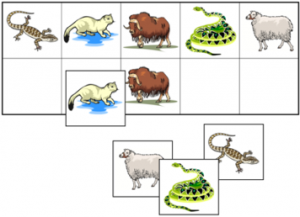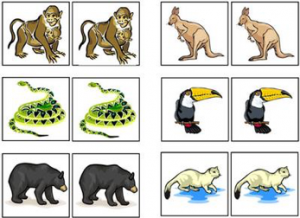Introduction
Success a child will experience later in life directly correlates with early cognitive development. Parents play a major role in the young lives of children, not only as caretakers; but they are crucial in the development of the child’s social, emotional, cognitive and physical well-being. While some developmental care may be an easy role for parents to fill, cognitive brain development can oftentimes be a challenge.
Cognitive development in early childhood can take place in games or activities interwoven in a child’s natural desire to play. Some examples of these games and activities may include reading books, simple jigsaw puzzles, or playing with building blocks. However, many cognitive development activities may be too expensive or time consuming and therefore unavailable to lower income families. Luckily, there are some options available at a low cost to the families while still of high value to a child’s cognitive development. One in particular is the “Matching Game” as described in the following portion of this paper.
Activity- The Memory Game


Game Objective-
- Remember the location of as many face-down cards as possible and pair them with their appropriate match.
Game Instructions-
- Place playing cards in front of the child in a random arrangement face up so the pictures can be seen.
- Allow a moment for the child to look over the cards to remember where each card was placed.
- Flip cards face-down remaining in their original positions placed.
- Ask child to find matching pairs between the facedown cards.
Supplies-
- Printed copy of a set of memory cards.
Discussion
The memory game has been used by parents engaging in the early cognitive development of a child for years. Memory games develop neuron connections in children increasing their memory load and concentration capabilities (Auger, 2016). A child’s ability to store and retrieve memories is key to the success in future brain development for things like reading and writing (Rawat, 2019).
Memory games are also multigenerational in their benefits. Adults can increase their memory by working their brain each day. Many Elderly individuals will use memory games as a way to maintain their brains through stimulation. Brain stimulation of memory games thus benefits the multiple generations who use them (“Educational Benefits of Memory Games for Kids”, 2019).
Another benefit of the memory game is the increase of visual acuity. This plays a vital role in a child’s ability to identify, understand, assess, and interpret objects (Rawat, 2019). Visual acuity may also grow to a point where a child may be able to mentally visualize multiple outcomes with minimal trial and error enhancing their ability to think critically. Some other benefits of a memory game include trained visual memory, increased short term memory, increased attention to detail, increased ability to notice differences and similarities, increased classification abilities, and an increased vocabulary (“Benefits of Match-up and Memory Games”, n.d.).
In conclusion, success a child will experience later in life directly correlates with early cognitive development. This development can be created for a child through activities or games that are stimulative to the brain. The memory game serves as a perfect example in which a child could receive notable enhancements to their cognitive abilities. Adults would also benefit from playing this game as brain teasers and exercises have the ability to increase memory retention. The memory game is a prime option for children and their families to enjoy together.
Work-Cited
- Auger, C. (2016). Four Ways to Promote Cognitive Development and Their Matching Activities. Retrieved from https://www.ccswfl.org/news/four-ways-to-promote-cognitive-development-and-their-matching-activities
- Benefits of Match-Up and Memory Games. (n.d.). Retrieved from https://www.montessoriprintshop.com/benefits-of-match-up-and-memory-games.html
- Educational Benefits of Memory Games for Kids. (2019) Educational Toys Expert.Retrieved from https://www.educationaltoys.expert/educational-benefits-memory-games-early-childhood-development/
- Rawat, M. (2019). Top 5 Benefits of Playing Memory Games for Kids.Education. Retrieved from https://vocal.media/education/top-5-benefits-of-playing-memory-games-for-kids
- Spellings, M. (2005). Helping Your Preschool Child. U.S. Department of Education Office of Communications and Outreach.Retrieved from https://www2.ed.gov/parents/earlychild/ready/preschool/preschool.pdf
- Thinking and Play: Preschoolers. (n.d.). Retrieved from https://raisingchildren.net.au/preschoolers/play-learning/play-preschooler-development/thinking-play-preschoolers
